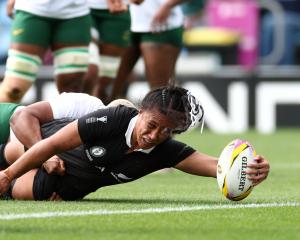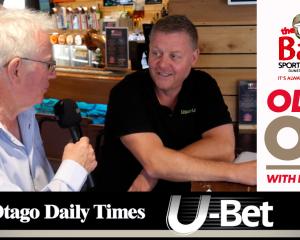If you are still coming to terms with the six-ball over, you better brace yourself for even more radical change - sport may take some unexpected turns during the next decade or three. Sports reporter Adrian Seconi takes a lighthearted look at a very serious report on the future of sport in New Zealand.
It is 2015. The future is here - and this is what we know.
New Zealand's population is ageing and becoming more ethnically diverse. Auckland will be challenged by growth while much of the rest of the country will be left wrestling with population decline.
Technology will play an increasing role in how people consume and prepare for sport, while social and commercial influences will also continue to shape how it is delivered.
We know all of this because that is what a report on the future of sport in New Zealand concludes.
It was commissioned by Sport New Zealand to help sporting bodies address future challenges and was released in April.
The report is real. What follows is, well, an extrapolation.
October 31: The All Blacks win the World Cup but elation turns to anger when it is revealed Richie McCaw's birth certificate, which was issued in Oamaru, turns out to be a fake. He was actually born in China and moved to Auckland to snap up a home in a moderately priced suburb for $2.5 million. New Zealand is disqualified and England is crowned world champion.
February 2016: Following the event we no longer talk about which happened last October, the All Blacks' marketing team repositions the brand. Changes include a new moniker - The All Blacks plus a dash of Silver on the Fern all you can eat and drink at Al's Restaurant. It is quite a mouthful but it quickly becomes part of our daily vernacular.
March 2016: Al chokes on a fish bite and dies. A competing fast-food restaurant chain steps in as the major-naming sponsor. Shortly after, a new study reveals deep fried-Mars Bars are actually good for us. The empirical evidence recommends a daily intake of 100g. The average weight of a prop balloons during the next 20 years.
January 2017: With virtually all of New Zealand's population sandwiched between the Bombay Hills and Albany, the Minister of Sport, the Rt Hon Hu Dat, a list MP who swept to power despite gathering just a few hundred electoral votes, decrees Eden Park is our national stadium. Five months later, Forsyth Barr Stadium is mothballed following the decision to play all Super rugby games at the studio in Auckland. Hu Dat responds angrily to suggestions he is centralising sport, arguing Auckland is located in the north of the country.
March, 2018: The Gambling Reform Bill is passed into law. Betting is made compulsory and the proceeds continue to be funnelled through chosen sporting organisations. Most of the money is spent administering sport. Little Johnny raises $500 from a sausage sizzle on the pretence of attending a basketball camp in Christchurch. He spends the money on a Nintendo Wii.
December 2018: Generation Me completes the move away from traditional social institutions like sports clubs. The only people left playing team sport are in their 40s. It is estimated the last team will be left with no-one to play by 2050. That estimate is ''revised'' following solo synchronised swimmer Juan Lapp's controversial win in the team category at the Halberg Awards. Many felt the award should have gone to extreme skier Tili Phibbs, after she completed the first triple rodeo 900 Japan with a 450 off the infamous Rock and Roll Horns. The sports editor of the Otago Daily Times resigns in disgust.
August 2019: Next generation Anton Olivers start rolling off the 3-D printing presses. There is a dramatic upswing in the use of the word ''cachinnation''. No-one is quite sure what it means but its use is followed by loud and hysterical laughter. The Olivers are eventually rounded up and prosecuted for crimes against lineouts. For an 8cm plastic figurine, the Olivers sure had a wonky throw.
June 2026: The Society for the Advancement of Civic Participation holds its eighth annual conference via Skype. A poor connection meant very little progress was made. However, there was general consensus sports clubs still had an important role to play in fostering a sense of community.
A day later: The last sports club closes its doors. It is replaced by a laundromat.
July 2044: New Zealand's average age reaches 103. Housie replaces bowls as the nation's national sport.
September 2049: A new app comes on the market. As well as providing customers with valuable information on how many likes your Facebook post has had in the last nanosecond and what colour your chakra currently is, it also calculates how likely you are to be successful at the highest level by analysing your genetics and measuring your energy and motivation levels. The GEM test, as it becomes known, provides a score from 1 to 100.
2050: Anyone with a GEM score of 70 or less is forbidden from playing sport. If the score slips below 50, that person is condemned to a life in sports journalism.











